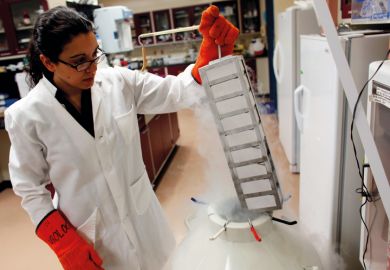The Trump administration is fulfilling a promised attack on fetal tissue research, using an ethics panel stacked with religious and anti-abortion activists to block grant awards by the National Institutes of Health.
The Ethics Advisory Board, appointed by the US Department of Health and Human Services, rejected all but one of 15 NIH grant proposals involving fetal research put before it.
The grant proposals had won the backing of the NIH’s usual scientific review processes, but the Trump administration has previously made clear its intent to find ways of hindering such work.
The advisory board’s report provided few details on the 14 rejected projects, although advocates of research involving aborted fetal tissue have said that such science is proving useful in medical challenges that include cancers, hepatitis and Aids.
The only grant proposal that won the panel’s approval is one that seeks to test alternatives to fetal tissue research.
The ethics board was appointed by the Trump administration under a federal law that allows it to arrange such reviews.
The board’s own description of itself noted that fewer than half its members “are scientists with substantial accomplishments in biomedical or behavioral research”.
Two of the board’s members offered dissent in the report that noted a clear majority of the board’s 15 members “are on the public record as being opposed to human fetal tissue research of any type”.
“This was clearly an attempt to block funding of as many contracts and grants as possible,” wrote the two members, who were not identified by name in the report.
The group was chaired by Paige Comstock Cunningham, an anti-abortion activist serving as interim president of Taylor University, a private Christian college in Indiana.
The report described the appointed members as offering objections to the NIH funding that included their ethical concerns surrounding the use of tissue from elective abortions.
Yet the members also expressed beliefs that research involving miscarriages suffered from quality issues due to tissue abnormalities and longer sample collection times compared with elective abortions.
The issue of fetal tissue research has been subject to political crosswinds for decades in the US, with Democratic presidents allowing it and Republican presidents restricting or forbidding it.
The Trump administration took office with a promise to let about 200 existing federally financed research projects involving fetal tissue continue at universities, then heavily limit it after that.
That pattern of uncertainty pushed California to become a global leader in research involving stem cells – the human cells often taken from embryos that have the ability to develop into many different types of cells.
After President George W. Bush imposed restrictions on such research in 2001, California created its own stem cell funding agency, CIRM, that it credits with medical breakthroughs and billions of dollars in scientific investment.
Register to continue
Why register?
- Registration is free and only takes a moment
- Once registered, you can read 3 articles a month
- Sign up for our newsletter
Subscribe
Or subscribe for unlimited access to:
- Unlimited access to news, views, insights & reviews
- Digital editions
- Digital access to THE’s university and college rankings analysis
Already registered or a current subscriber?






